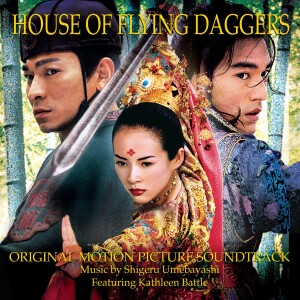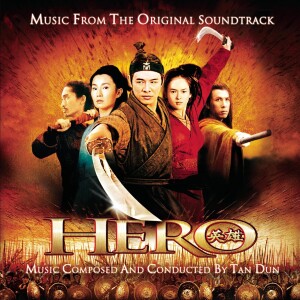 Recent years have witnessed a major resurgence of interest in Asian culture in the West, as anime and manga become more and more popular, and as Asian martial-arts epics receive major releases in American movie houses. The first real mainstream hint of this resurgence came with 2001’s release of Crouching Tiger, Hidden Dragon, which received numerous awards and award nominations as well as critical acclaim and, for a subtitled foreign film, superb box office. Crouching Tiger was also noted for its musical score, which earned its composer, Tan Dun, an Oscar for his efforts. This interest in all things Asian has not escaped the film music world, where Tan Dun has become a figure of considerable interest, alongside such composers as Joe Hisaishi (the longtime musical collaborator of legendary anime director Hayao Miyazaki) and Kenji Kawai, as well as reexamination of such past composers as Toru Takemitsu (still Japan’s most famous classical music export).
Recent years have witnessed a major resurgence of interest in Asian culture in the West, as anime and manga become more and more popular, and as Asian martial-arts epics receive major releases in American movie houses. The first real mainstream hint of this resurgence came with 2001’s release of Crouching Tiger, Hidden Dragon, which received numerous awards and award nominations as well as critical acclaim and, for a subtitled foreign film, superb box office. Crouching Tiger was also noted for its musical score, which earned its composer, Tan Dun, an Oscar for his efforts. This interest in all things Asian has not escaped the film music world, where Tan Dun has become a figure of considerable interest, alongside such composers as Joe Hisaishi (the longtime musical collaborator of legendary anime director Hayao Miyazaki) and Kenji Kawai, as well as reexamination of such past composers as Toru Takemitsu (still Japan’s most famous classical music export).
Asian film scores often feature a blend of Eastern and Western influences. Often this involves a mixture of ethnic elements, either in instrumentation and melodic material or both, and the lush sounds of the Western symphony orchestra. The result can, admittedly, sound like a hodge-podge of styles, but in the hands of the more thoughtful composers, what emerges is a unique soundscape that is all the more refreshing in an era when Western filmscores are seemingly more homogenous every year.
 Tan Dun’s score to Hero is a fairly contemplative effort, and is marked by the restraint of a classical composer. In its slowly developing melodic lines and its overall meditative mood, the score is somewhat reminiscent of Toru Takemitsu’s minimalistic score to Akira Kurasawa’s Ran, and it feels less overtly ethnic than House of Flying Daggers. Tan uses sparse orchestrations and pentatonic melodic material, combined with lots of low drums, a male choir, and violin solos played by Itzhak Perlman to create a non-distinct Asian character for the Hero score. It’s effective, and it’s similar to the approach he took for Crouching Tiger. There is quite a bit of connecting tissue between those two scores, but Hero still manages to stand separate. Hero feels more like a traditional orchestral filmscore with an ethnic inspiration.
Tan Dun’s score to Hero is a fairly contemplative effort, and is marked by the restraint of a classical composer. In its slowly developing melodic lines and its overall meditative mood, the score is somewhat reminiscent of Toru Takemitsu’s minimalistic score to Akira Kurasawa’s Ran, and it feels less overtly ethnic than House of Flying Daggers. Tan uses sparse orchestrations and pentatonic melodic material, combined with lots of low drums, a male choir, and violin solos played by Itzhak Perlman to create a non-distinct Asian character for the Hero score. It’s effective, and it’s similar to the approach he took for Crouching Tiger. There is quite a bit of connecting tissue between those two scores, but Hero still manages to stand separate. Hero feels more like a traditional orchestral filmscore with an ethnic inspiration.
With House of Flying Daggers, however, we find a more directly Asian sound. Composed by Shigeru Umebayashi — who was once the front man for the Japanese New Wave band EX — the score to House of Flying Daggers is more animated than Hero‘s, and it supplements the traditional orchestral sound with Asian instruments such the Chinese erhu and pipa, as well as wooden flutes and Chinese percussion. Much of the score is spun around the tune first heard in the second track, which is a song performed in the film by actress Zhang Ziyi; there’s another song at the end of the album, performed by soprano Kathleen Battle. The tone of House of Flying Daggers is more specifically Asian, and its overall sound is more vibrant than Hero‘s. The action music is more frenetic, and the tone of the passionate scenes is very lush. If Tan Dun’s Hero score is a Classical work, then Shigeru Umebayashi’s House of Flying Daggers is a Romantic one.
Both scores, though, constitute thoughtful film composition outside the film music mainstream, and both reward those who are willing to go beyond that mainstream.
(Sony Classical, 2004)
(Sony Classical, 2003)
